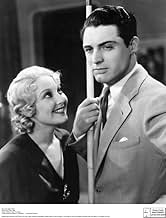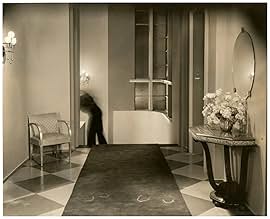An affair is almost exposed when Claire's husband unexpectedly returns early from the Summer Olympics.An affair is almost exposed when Claire's husband unexpectedly returns early from the Summer Olympics.An affair is almost exposed when Claire's husband unexpectedly returns early from the Summer Olympics.
- Awards
- 3 wins total
- Studio Official
- (uncredited)
- Manager of Neopolitan Hotel
- (uncredited)
- Chou-Chou
- (uncredited)
- Porter
- (uncredited)
- Singing Gondolier
- (uncredited)
- Porter
- (uncredited)
- Boulevardier
- (uncredited)
- Man in the Manhole
- (uncredited)
Featured reviews
This sing-songy film is a delight to watch. It is fast-paced, comedic, and filled with a stellar cast, but it is not well known today. Film collectors find it interesting because it marks Cary Grant's first screen appearance and because it is one of the few films of Lili Damita, a popular but heavily-accented French star. Her career fizzled quite quickly, but not before she appeared with stars like Gary Cooper and Laurence Olivier.
Fans of the pre-code era will enjoy this one quite a lot, as it is peppered with naughty jokes ("I was living in Cin--, I was Naughty.") and a running gag about Todd losing her clothes.
So all of this experimental art design is the backdrop for a pretty typical precode farce. Bachelor Gerald Gray (Roland Young) is having an affair with married Claire Matthewson (Thelma Todd). They plan to take a trip to Venice together because Claire's husband (Cary Grant as Stephen Mathewson) is at the summer Olympics throwing the javelin. But he returns unexpectedly, just in time to see the two train tickets that his wife had ordered. A poorly constructed alibi is devised - Claire was planning to take the trip alone. The two tickets were mistakenly left there for neighbor Gerald and his wife. Stephen suspects what is going on and insists that he and Claire take that trip and that Gerald and his wife come along on the journey with them, not believing that there actually IS a wife. So Gerald hires a starving actress (Lili Damita as Germaine ) to play the part of his wife. But even this is a switcheroo as the actual actress hired for the job (Claire Dodd) doesn't want it and gives it to Germaine. Complications ensue.
If Cary Grant had been just a couple of years further along in his film career, doubtless he would have had the part of the carousing bachelor and Roland Young would have been the cuckolded but suspicious husband and the film would probably have been better for it. But Grant is humorous carting around those javelins as phallic symbols. Irving Bacon was an odd choice for Roland Young's butler in a continental setting since he really seems like he would be better suited working in Mr. Drucker's store in Hooterville.
I'd recommend it for the weirdness of it all and to see Cary Grant in his first film role.
*** 1/2 (out of 4)
Hilarious pre-code from Paramount has Roland Young playing Gerald Gray, a man dating a married woman (Thelma Todd). Things take a turn for the worse when the couple return to her home to find her husband (Cary Grant) there and in order to stay out of trouble the man's best friend (Charles Ruggles) tells the husband that the friend is actually married and the happy couple are on their way to Venice. The husband, not a bit fooled, decides to go along on the trip so the friend must find a fake wife (Lili Damita) to go along with the plan. This is a remake of a 1926 film and it's based on the play Naughty Cinderella. The naughty is certainly correct because this Paramount comedy has quite a few pre-code elements that would soon find themselves banned. Needless to say, having a film centered around a married woman dating other men was certainly a no no but it makes for one great laugh after another. After viewing the film I was really shocked to see that it wasn't more popular because the familiar cast is terrific and we get so many sexual jokes that it really stands out. The dialogue certainly implies many dirty jokes including one bit about "B.J." as well as our two lead actresses showing some skin. Of course we don't get any actual nudity but there's a very charming scene of Damita proving she can be naughty by taking her clothes off and coming off like a vixen. There's also a running joke with Todd constantly getting her clothes ripped off in a variety of ways. Both women have their legs constantly being shown as well as every other bit of skin they can get on camera. These elements certainly give the film a fresh touch and a pretty sexual one as well. Then we have the terrific performances that make the film memorable. Damita, who I had just seen in FRIENDS AND LOVERS, is must better here and in fact turns in a hilarious performance. I was really shocked to see how great she was here because her comic timing is right on the mark and she also plays the more dramatic, romantic moments just as well. Her coming timing really makes her character come to life and her previously mentioned seduction scene was priceless. Ruggles nearly steals the film as the silly assistant who gets this whole thing started. Todd delivers one of the best performances I've seen from her as her timing is great and just check out the wonderful scene where her married character gets jealous by her lover's fake wife. Young is also right on the mark and his chemistry with Damita is great. Then we have Cary Grant in his first role. I was surprised to see how natural he was but he plays the jerkish husband to perfection. I think the film starts to wear thin during the final act when every ones love starts to pour out but everything leading up to this is quite priceless. The performances, sexuality and laughs make this a must-see for fans of classic cinema.
It is quite funny, but you have to give it a chance to warm up, as it takes a few minutes to get underway. The humor is very subtle and probably wouldn't go over well with modern audiences (see Adam Sandler). It comes with some unique quirks, like Cary Grant delivering a few lines in song, but once into the picture some old pros take over. Roland Young and Charles Ruggles, two veterans of the stage, have some of the best exchanges of situational dialogue and are aided by Thelma Todd, a comedienne who had a bright future but who was murdered around the time of the film's release. Her murder was never solved. Cary Grant plays it straight and Lili Damita is everyone's love interest but is the weakest member of the cast. It is very much like a filmed play, with just a few indoor sets, and there are only six cast members. The blue-tinted nighttime scenes were a nice, unexpected touch.
In short, it is well worth your time but give it a chance to get past the slow beginning. It is actually a quick 80 minutes.
This movie has all the earmarks of a Lubitsch picture: the European settings (Paris, Hollywood, which Lubitsch said he much preferred to Paris France; Venice, where he had set the opening of TROUBLE IN PARADISE two years earlier) and is the sort of racy European comedy that Paramount specialized in until the Production Code killed them dead later that year. The setups are all Lubitsch: the recitative number "Madame Has Lost Her Dress" that opens the movie; The sexual imagery of Cary Grant carrying around a bagful of javelins and reducing Roland Young and Charlie Ruggles to blithering idiocy; Thelma Todd in her underwear; and into this mess lands Lily Damita, an honest girl reduced to sleeping on movie sets: trouble in Paris, Hollywood.
Although Tuttle lacks the ability to direct actors in the small, exquisite details that Lubitsch did, he had a fine hand at framing and storyline. The movie is near perfect, except for the miscasting of Roland Young as the love interest..... but perhaps that is the point of the matter: we do not always fall in love with Maurice Chevalier.
Did you know
- TriviaFilm debut of Cary Grant.
- GoofsWhen Bunny and Stephen, carrying his javelins, after arriving back unexpectedly from his trip to the Olympics, go into the next room, a large shadow of the boom microphone can be seen moving on the doorway and wall behind it.
- Quotes
Claire Mathewson: [they are seated in the back of their car; Claire has had her dress torn by the car door] Gerald, aren't you going to do anything?
Gerald Gray: Here?
Claire Mathewson: No, no. I mean about discharging your chauffeur
Gerald Gray: Oh, oh let me keep him. I've let you keep your husband
Claire Mathewson: I haven't kept him
Gerald Gray: What?
Claire Mathewson: He left this morning
Gerald Gray: For good?
Claire Mathewson: No, no, for the Olympic Games at Los Angeles. He's in them, you know. Haven't you ever heard of Steve Mathewson, the javelin thrower?
Gerald Gray: Javelin thrower?
Claire Mathewson: ah ha
Gerald Gray: Do you mean those long, murderous harpoon things?
[she nods]
Gerald Gray: Claire, the moment you meet a man, right after you've said 'how do you do?' you should add 'my husband throws javelins'.
- ConnectionsRemake of Good and Naughty (1926)
- SoundtracksThis Is the Night
Written by Sam Coslow and Ralph Rainger
- How long is This Is the Night?Powered by Alexa
Details
- Release date
- Country of origin
- Official sites
- Languages
- Also known as
- Natten är vår
- Filming locations
- Production company
- See more company credits at IMDbPro
- Runtime
- 1h 20m(80 min)
- Aspect ratio
- 1.33 : 1


































